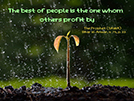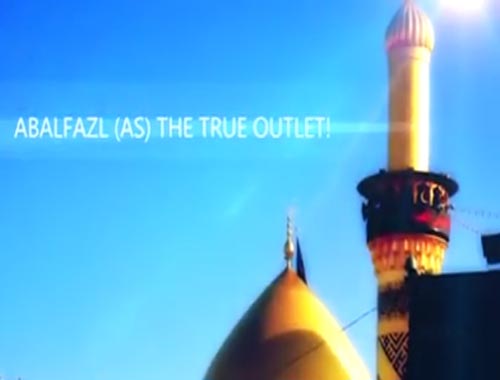Man from the View Point of Existentialism
- Details
- Hits: 1768
Man from the View Point of Existentialism
As existentialism is one of the most well‑known contemporary schools of philosophy which has devoted much of its attention to man, we must study its doctrines in order to have a clear idea about the prevalent theories about man. For this purpose we propose first to reproduce some of the views of the thinkers and the commentators of this school and then to make our comments on them:
Existence of man precedes his essence, and hence, firstly there exists no purpose, plan or destiny concerning him prior to the emergence of his personality or his existence; and secondly, as free agents we can choose and change our essence at will. Jean Paul Sartre
I emerge alone and faced by the commotions and anxieties go forward and backward. That is what gives shape to my existence. It is I who can overcome all hurdles and provide value to my existence. Nothing other than me can give satisfaction to me. I have severed my relations with the world. I fight my own basis, that is the non‑existence, which I am myself. It is my duty to bestow reality on the meaning of the world and of myself. I alone take a decision. Principles of the Philosophy of Existentialism
As far as `disappointment' is concerned, that means that we confine ourselves to depending on what is within our will or within the total possibilities, which make our action possible. We sever our relations with everything else and cherish no hope. When Rene Descartes said: "Subdue yourself, not the world", he actually meant that we should work without cherishing a hope. Sartre
The conception of man is synonymous with a mixture of anxiety and encouragement. When a man makes a commitment and determines that by his action he is not only deciding about himself and choosing what he shall be, but is also giving a law for all mankind, at that moment he cannot avoid feeling complete and deep responsibility. Sartre
Those who bear such a responsibility as that of a military commander who undertakes to launch an attack, know well the anxiety with which we are concerned. Sartre
In respect of `bad intention' and `self deception', which must be avoided, Sartre says:
As the human beings are free and independent beings and they themselves invent their moral standards, the only thing which they may be asked to do is to be loyal to their own standards and values.
The assertion that man is a free agent, necessarily means that human beings are not a plaything in the hands of gods or any power other than themselves. They have absolute freedom, and are `released', `independent', not interrelated and `not interconnected'. In short, `they axe what they axe'.
Quoting Dostoyevsky, who wrote: "If God did not exist, everything would have been permissible", Sartre says: This is the starting point of this school. Really if God does not exist, everything is permissible. Consequently man feels dejected, for he finds nothing to depend upon either within himself or outside himself.
Man is condemned to be free. I say "Condemned", because he has not created himself. Still he is free, and from the moment he is dropped into this world, he is responsible for all his actions.
In respect of the views of this school in regard to man, the following points may be deduced from what has been cited above:
(1) In contrast to other natural beings which have a definite and ready‑made essence, man has no particular essence. His essence is that which he makes himself.
(2) Man is a free agent and has power of choice.
(3) No will, principle or law restricts the range of man's freedom.
(4) It is man himself who is responsible for his own making. His destiny rests exclusively on his personal choice. He is also responsible for making his social environment and bringing about changes in his natural surroundings, and that too on the basis of the principles which he formulates himself.
(5) For this very reason he is always agitated and he feels uneasy because he can have no guidance or support from outside and the choice he makes is not easy.
(6) Man feels lonely and detatched from everything. As he has to depend on himself alone, he feels disappointed.
(7) The uneasiness and constructive `disappointment' that induce him to `action', are like everything else the outcome of his own `action'.
As for the belief in God, it may be said that this philosophy does not necessarily amount to atheism.
Sartre says:
There are two types of the existentialists. On the one hand there are Christian existentialists, among whom I name Karl Jaspers and Gabriel Marcel, both of whom confess to be Catholics. On the other hand, there are existentialists, who are atheists, like Martin Heidegger and I. The only thing common between these two types of individuals is that they generally believe that existence of man precedes his essence.
At another place Sartre says:
In the philosophy of existentialism the conception of atheism does not involve the denial of the Creator. It only means that nothing would be upset even if the Creator did not exist. Man should himself find out and know that no means of his deliverance exist anywhere.
He again says:
If the existentialist is greatly disturbed at the idea of the non‑existence of God, that is because in that case the possibility of finding `values' in perceptible Paradise disappears totally. Further, obviously no virtue can exist, for no conscience is so perfect and infinite that it should think of every virtue. It is not written anywhere that the virtue has a definite existence and is always judged rightly.
We observe that the existentialists who hold atheistic views do so because they imagine that man can have absolute freedom only if there is no outside `will' behind him to determine his action.
Sometimes they expressly say: Should there be a God who destines everything or at least knows everything, all future events will necessarily take place as anticipated by Him. For this reason the denial of an Almighty Creator is a logical pre‑condition of the absolute freedom of man.
We propose to analyse this point while making a comparative study of Islamic and existentialist view‑points.











